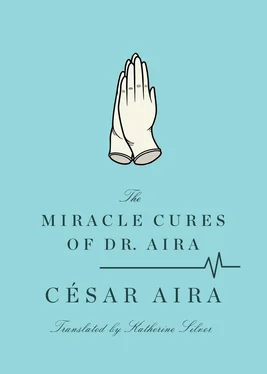He had just sat down when he had to stand up again, because the other brothers had come in to tell him that the patient was awake and expecting him. They didn’t sit down, so he didn’t again, either. They told him that they’d given him his injections early so that he would be lucid at ten o’clock. They didn’t know if it was necessary, but the patient himself had requested it.
“Perfect,” said Dr. Aira, just to say something and without giving an explanation such as they must have been expecting.
In the blink of an eye, he didn’t know exactly how, they were climbing the stairs to the bedroom. The moment of truth was approaching.
The truth was, he hadn’t finished deciding what to do. He had spent the last two days considering his options with the same uncertainty he’d had for the last few decades, ever since that day in his far-distant youth when he had intuited the Cures. The idea had remained more or less intact since then, not counting the natural alternation between doubt and enthusiasm characteristic of a genuinely original concept. It had been the center of his life, the pivot around which his readings, meditations, and quite varied interests had turned. Of course, in order to keep it in this central position he had had to endow it with a plasticity that resisted any definition. It had always been right in front of his nose, like the proverbial carrot hanging in front of a donkey, indicating the direction of his prolonged flight forward. He owed his life to it, the life he had, after all, lived, and for this he was grateful. He could not complain about it just because it refused to give him a practical set of instructions at a decisive moment. He didn’t want to seem ungrateful, like those infamous scroungers who spend twenty years taking money from a generous friend, and when finally the friend can’t or doesn’t want to do as they ask, they condemn him without appeal.
Moreover — as he had been repeating to himself throughout that atypical weekend — something would occur to him. It’s not that he trusted his ability as an improviser; on the contrary, he had serious reasons to distrust it. But he knew that for better or for worse he’d manage, because one always does. It’s enough for time to pass, and it inevitably will. It wasn’t strictly a question of “improvising” but rather of finding in the teeming treasure of a lifetime of reflections the one gesture that would do the trick. It was less an improvisation than an instantaneous mnemonic. Evaluating the results was another issue. There would be time for that, too. After all, if it was a failure, it would be the first, and the last.
The door to the bedroom. They opened it; they motioned for him to go in. He entered. . And it was as if he had entered a different world, incomparably more vivid and more real, a world of pure and compressed action where there was no room for thought, and where, nevertheless, thought was destined to triumph in the end.
The first thing that struck him was the lighting, which was very white and very strong; it seemed excessive, though perhaps this was due to its contrast with the gloomy semidarkness in the rest of the house. Even so, it was the last thing one would expect in a sickroom, unless it was an operating room. He immediately turned to look at the bed and the man lying in it, which barely gave him a chance to register along the outer edges of his attention certain elements that contributed to the creation of a high-tech environment and explained the lighting.
The man in the bed warranted Dr. Aira’s most intense interest. Never before had he seen someone so close to death. He was so close that he had already shed all his attributes and had become purely human. By the same token, this shedding had removed him from the human. His first impression was that it was too late. If there was even the remotest possibility of bringing him back to life, it would have to be via one of his qualities. And it looked as if he hadn’t a single one left; perhaps, in the spiritual process of preparing himself for death, he had undergone a “cleansing” that had been set in motion by the illness. But this was not the case. Despite everything he and the cancer had done, one of his attributes remained: wealth. He may have cut all his ties to life, but he remained the owner of this house, and of his lands and factories. And that would suffice, for money had the marvelous property of including everything else. He should definitely start there.
Just thinking about it was enough to re-orient him in reality. He looked around. The room was large, and many people were there, all of them strangers, except for the patient’s brothers. They were all looking at him, but as nobody showed any intention of introducing themselves, he merely greeted them with a nod and turned his attention to the room and the furnishings. There were chairs, armchairs, tables, bookshelves, and a lot of electronic equipment. It took him a moment to notice — even though they stood out more than anything else — two supermodern television cameras each on top of a tripod, one on either side of the bed and each with its respective cameraman: two young men wearing wireless earphones. The spotlights and large microphones with black felt heads placed at strategic spots apparently belonged to the same set-up, as did the echo-reducing panels and a technician sitting in front of a sound board next to the wall. He wondered, intrigued, if this was a custom he had never heard of, to record the final days of important people. That wasn’t it, he found out right away, because one of the brothers, as if reading his mind, said:
“If you don’t mind, we’d like to film you while you work,” and without giving him time to respond, he rushed to explain. “It’s to cover ourselves to the stockholders, just in case.”
Dr. Aira mumbled something, and looking down at the ground, he noticed that there were no cables, which was quite fortunate because otherwise he would surely have tripped on them.
With a discreet signal from the brother who had just spoken, the two cameramen looked through their viewers and switched on the little red lights on their equipment. As if a lever in his body had been released, Dr. Aira stopped feeling natural. From that moment on, what was happening on the surface no longer coincided with the episodes of his psyche, which, now liberated from expressive restrictions, took on their own velocity. In a way, the exterior world could be deemed void: the nurses, the relatives who took their seats as if expecting to listen to a concert, and a small group of teenagers who looked at him with vague disapproval. What did he care! Relieved of naturalness, he felt as if anything was allowed.
He walked over to the bed. The man was lying on his back, his head and upper back propped against large pillows and with an orthopedic brace around his neck. His arms were stretched out on top of a sky-blue sheet, which was folded down over his heart. He was not wearing a watch. A thick gold wedding band was on the ring finger of his right hand.
His features were frozen into a somewhat ill-tempered, irritable grimace. He had not a single hair on his head. He was staring back at him, but his pupils were not moving. Dr. Aira tried to read those eyes that were locked on his, and the only thing that occurred to him was the melodramatic idea that they had the texture of death. Death is always nearby, and its shapes and colors inhabit all drawings of the world, in full view but also hidden, all too visible, acting like a narcotic on one’s attention. One sees only what one wants to see. As if disappearance formed part of appearance. Sometimes one needs a word (the word “death”) to make volumes and perspectives stand out. On this occasion the word had been spoken, and Dr. Aira understood that only through it did he have any chance of success. The only course of action was to take the man for dead, the activities of his life spent; not only could he consider it over, along with all the treatments and spiritual remedies, but he should, then begin from the other side. There was no other way to begin.
Читать дальше












